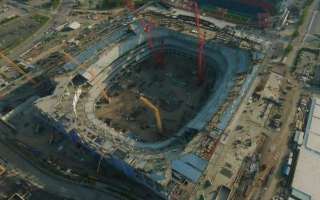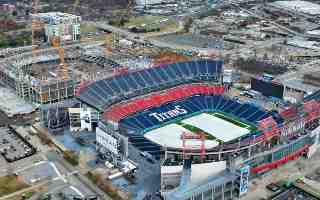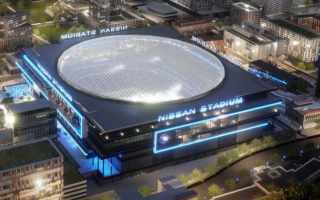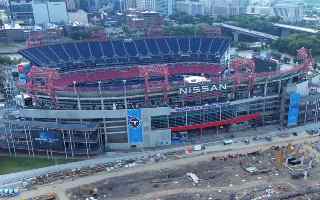New Nissan Stadium
| Capacity | 60 000 |
|---|---|
| Country | United States of America |
| City | Nashville |
| Clubs | Tennessee Titans |
| Category | Design being implemented |
| Cost | $2.1 B |
| Construction | 2024–2027 |
| Design | Manica Architecture |
| Contractor | Tennessee Builders Alliance |
Advertisement
New Nissan Stadium – design description
How did plans for a new stadium for the Tennessee Titans originate?
The NFL team Tennessee Titans' current facility, Nissan Stadium, was built between 1997 and 1999, when the team moved from Houston to Nashville. Prior to the stadium's construction, a lease agreement was signed with the city, requiring the local authority to bear the costs of maintaining and renovating the arena.
With the cost of upgrades rising, in early 2022 the Titans, together with the local authorities, began to question the economic sense of keeping things as they were. A subsequent study by Venue Solutions Group showed that the continued cost of maintaining the facility until the end of the contract (2039) would total between $1.75bn and $1.95bn.
The calculations showed that in this situation it would make financial sense to build a new stadium. Thus, preliminary explorations for the possible construction of a new facility began (the possibility of redeveloping Nissan Stadium had previously been rejected). On October 25, 2022, the first renderings of the new stadium, prepared by Manica Architecture, were presented.
What will the new Tennessee Titans stadium be like?
The new arena would be built next to Nissan Stadium, to the east of it, on the site previously occupied by car parking lots. The new site's lease is to run for a period of 30 years. The facility would be able to hold around 60,000 spectators, almost 10,000 fewer seats than the existing stadium, and would become the smallest capacity venue in the NFL, although it would also rank among the most modern.
One of the major features of the stadium would be its fully enclosed roof, covering not only the stands but also the field. The canopy would be permanently installed (not retractable) and is to be covered with a translucent ETFE material. The stands will be divided into four tiers and are expected to provide very good visibility from each section. The facility is to have extensive premium seating and offer the possibility to buy personalised seats. The stadium will also feature LED screens and the pitch will have an artificial surface.
Inside, there will be numerous spaces for business and the extensive commercial offer will ensure that the facility will also be vibrant outside of match days and generate revenue to cover its maintenance costs. Numerous food and beverage outlets and hospitality offerings are expected to have a positive impact on the spectator experience during matches.
The outside of the stadium will feature terraces with views of the city. The exterior of the facility is inspired by Nashville's distinctive architecture. Next to the stadium, a 12,000-square-foot plaza will be created for outdoor events or as a meeting and recreational space for the local community.
The stadium is also to feature a number of environmentally friendly and sustainable solutions, aimed at minimising the amount of waste produced and the use of water and grid electricity. The aim for the designers is to meet the conditions for LEED Gold certification.
In November 2023, it was announced that a sponsorship agreement had been reached, under which the new facility will be named Nissan Stadium (initially the name Tennessee Stadium was used). The agreement is expected to run for 20 years. This is a continuation of the partnership, as the name Nissan Stadium has been carried by the existing Tennessee Titans facility since 2015.
What events will take place at the new stadium in Nashville?
The main user of the stadium will be the NFL team Tennessee Titans, hence it has been designed primarily as an football arena. Four games per season at the facility are also to be played by the Tennessee State Tigers college football team, free of charge for use of the arena.
The facility is expected to be suitable for hosting major events such as the Super Bowl, College Football Playoff National Championship and for example WrestleMania. In addition, the stadium will enhance Nashville's offering in terms of hosting major concerts and festivals, reinforcing its reputation as a 'music city'.
What are the costs of building a new stadium for the Tennessee Titans?
The cost of building the stadium is estimated at $2.1 billion, of which $840 million is to be provided by the Tennessee Titans (support for these expenses is to be provided by the NFL), $500 million is to be contributed by the State of Tennessee and $760 million is to come from the metropolitan authorities. The total contribution from public finances will be $1.26 billion, which will be the largest such subsidy for the construction of an NFL stadium in history.
However, the metropolitan authorities will no longer have to bear the high maintenance costs of Nissan Stadium. Upkeep of the new facility will be taken on by the Tennessee Titans, although with an extensive commercial offering and a focus on hosting as many events as possible, the facility should earn its own money. Metropolitan's approval of the grant allows it to leverage additional investment funds from the state or NFL league. The new stadium should also bring in more tax revenue for the local budget.
In addition to the economic rationale, the decision to build a new stadium also means significant branding benefits. Nashville will have a unique, state-of-the-art stadium capable of hosting major events. The facility will fit in with the trend of extremely expensive, fully-covered stadiums that have been built recently for several NFL teams and will serve residents for decades to come. In addition, the city will gain the land left behind by Nissan Stadium (once the new arena opens, the old stadium will be demolished), which can be used for housing, green space and other community amenities.
On April 25, 2023, the Metropolitan Council voted to approve the financial plan.
When will the new Tennessee Titans stadium be built?
The coverage of the construction of the new Tennessee Titans stadium can be seen on a separate subpage
On August 17, 2023, the main contractor for the new stadium was announced. The task was given to four companies: ICF Builders, Polk & Associates, Turner Construction Company and AECOM Hunt, which formed a consortium called the Tennessee Builders Alliance (TBA). The groundbreaking ceremony took place on February 29, 2024, and according to the schedule, the facility should be ready in spring 2027.
Advertisement
Renderings
-

2023 © MANICA 
2023 © MANICA 
2022 © MANICA 
2023 © MANICA 
2023 © MANICA 
2022 © MANICA 
2022 © MANICA 
2023 © MANICA 
2022 © MANICA 
2022 © MANICA 
2022 © MANICA 
2023 © MANICA 
2022 © MANICA 
2022 © MANICA 
2023 © MANICA 
2023 © MANICA 
2023 © MANICA 
2022 © MANICA 
2023 © MANICA 
2022 © MANICA 
2022 © MANICA 
2023 © MANICA 
2023 © MANICA 
2023 © MANICA 
2022 © MANICA 
2022 © MANICA
Related news
2025
-

USA: Steel structure of the new Nissan Stadium nearing completion
Construction of the new Nissan Stadium in Nashville has entered a decisive phase. The assembly of the steel structure is expected to be completed later this month, marking a major milestone in the $2.2 billion project.
-

North America: Stadiums ruled out of the 2026 World Cup host race
There’s less than a year left until the start of the 2026 World Cup. The USA, Canada and Mexico are preparing to host the tournament, but not all cities met FIFA’s expectations. We present 15 stadiums that were once in the running but were ultimately left out.
-

USA: Construction of New Nissan Stadium 100 feet next to the old venue
The Tennessee Titans organized a media tour of the New Nissan Stadium construction site, where project manager Kellen DeCoursey provided the latest updates on the progress of the work.
2024
-

USA: What’s happening with new Tennessee Titans stadium construction?
It’s been eight months since construction began on the new Tennessee Titans stadium, and significant progress has been made. According to team officials, foundations are already being laid on the southern and northern sides of the stadium.
-

USA: Construction of new Nissan Stadium, NFL's smallest stadium, to be watched live
At a cost of $1.26 billion, a new Tennessee Titans venue will be built, which will be the smallest stadium in the NFL. However, it will not be far from modern standards. Despite staffing issues, construction has just begun and all work can be followed via a camera provided by the club.
-

USA: New Nissan Stadium construction has started
The last day of February marked the start of construction, not only on the future stadium, but also on a number of other projects along the Eastern Shore. The facility, which is expected to be built within three years, will be the NFL's new venue and a potential site for hosting the Super Bowl.
-

USA: Titans secure naming rights with Nissan for a new stadium
The Tennessee Titans have announced a significant milestone in their journey towards a new era of football in Nashville. In a landmark agreement, the Titans have secured a 20-year naming rights deal with Franklin-based Nissan North America.
2023
-

USA: Titans appoint construction team to build new stadium
The Titans of the NFL have announced the appointment of the Tennessee Builders Alliance (TBA) a consortium of local and national firms, to manage the construction of new venue. TBA will serve as Construction Manager at Risk on the project team, and the Metropolitan Sports Authority approved the selection on August 17.
-

USA: Green light for $760m bond for new NFL stadium
Metro Sports Authority made the milestone decision Thursday to issue $760 million worth of revenue bonds to finance the construction of a new $2.1 billion enclosed East Bank NFL stadium and concert arena.
-

USA: Tennessee Titans select firm to aid with new stadium project
The NFL's Tennessee Titans have selected a studio to support design work on their planned new stadium. That studio is TVS, which will take on the position of Architect of Record and will work with the Design Architect, MANICA, to guide the design team through the completion of the stadium plans and then administer construction works.
-

USA: Tennessee Stadium get backing from City Officials
On the 17th of October, 2022, Nashville Mayor John Cooper finally revealed details regarding the development of the Tennessee Titans Stadium. Fans of the franchise should be thrilled as the idea is about to become a reality.
2022
-

USA: New renderings of future Tennessee Titans arena
A few weeks ago we reported that the days of the outdated Nissan Stadium are numbered. Nashville will see the construction of a facility that, even at design stage, has already wowed not only locals, but also fans of stadium architecture from around the world.
-

USA: Titans to move to new home soon?
Tennessee Titans have released renderings of the facility that will most likely replace the run-down Nissan Stadium and become their new home arena. The design is incredibly impressive. Once built, it is sure to become one of Nashville's landmarks.

 StadiumDB
StadiumDB